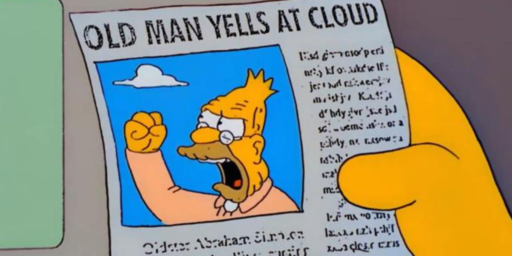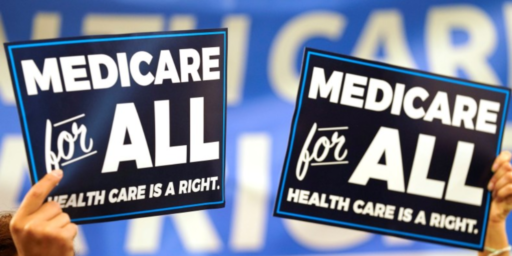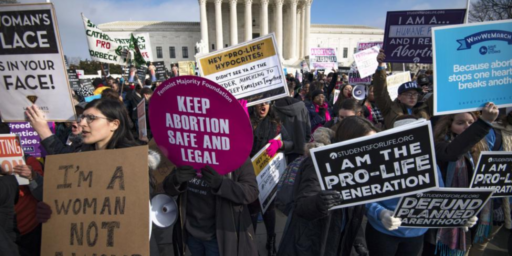The First Baby Boomer Applies for Social Security
Well, that moment that has been much talked about has finally arrived. The first member of the Baby Boomer generation has applied for social security.
The nation’s “first” baby boomer, a retired teacher from New Jersey, applied for Social Security benefits Monday, signaling the start of an expected avalanche of applications from the post World War II generation.
Social Security Commissioner Michael Astrue called it “America’s silver tsunami.”
Kathleen Casey-Kirschling applied for benefits over the Internet at an event hosted by Astrue. Casey-Kirschling was born one second after midnight on Jan. 1, 1946, gaining her recognition as the first baby boomer — a generation of nearly 80 million born from 1946 to 1964, Astrue said.
While, I think the rather gloomy predictions about Social Security are largely true, the problems that welfare program poses are far less than the problems posed by the Medicare system. Having 80 million people enter the Medicare system is going to increase demand. Given that there are few if any policies currently in place to expand supply and that there are reasons to suspect that no such policies will be forth coming for awhile health care expenditures have nowhere to go but up.
Last week, Bush’s budget director called the growth in Social Security, Medicare and Medicaid a “fiscal train wreck.” The three entitlement programs make up nearly half of all federal spending, a share that is expected to grow.
While one might disagree with Bush’s policies his budget director is exactly right in his assessment of an on-coming fiscal train wreck. When you add 10,000 people, on average, per day for the next 20 years to Medicare things aren’t going to get better.
And any idiot who suggests that we should expand Medicare to cover the entire population is simply a complete scoundrel. Given current projections, Medicare’s shortfall is measured in trillions of dollars, and there isn’t much hope for economic growth to solve the problem. Keep in mind these projections are based on as the system as it currently works. Add in a couple hundred million more people and the numbers get even worse.
Casey-Kirschling said her generation won’t let Social Security fail.
No, they may actually be the reason why Social Security and Medicare fail.






I suspect that the medicare and medicaid will be bandaged over as other national health cares have done by increasing waiting time and eventually the Canadian solution of holding a lottery for those who have the “right” to get an appointment to actually see the doctor.
Is that supposed to be helpful?
How does moving 80 million people off of private insurance on to Medicare increase demand on the overall health care system?
Again assuming the goal is to insure everyone, how is the supply issue different if everyone is covered under Medicare vs everyone being covered under private insurance?
The primary supply problem for Medicare (as opposed to other insurance) is that not all doctors will take Medicare patients. If Medicare were expanded to cover everyone then all doctors would accept Medicare patients and the system would have a large influx of healthier insurees most of whom would be contributing to the system. The shortfall could actually decrease or disappear depending on the size of the contribution to participate.
This, of course, assumes that the people you are adding are not contributing to the system. Do you think that is an honest assumption?
This would not be my first choice for a universal coverage plan, but I don’t think your argument as presented above holds water.
The only way to lower overall demand is to deny service either by denying coverage or rationing coverage. You apparently prefer the former to the latter.
I am a bit unclear on how social security counts as “welfare”. If I start collecting at age 72, it will be after 54 years of paying my hard-earned money into the system.
This post is little more than a rant…
Watch out! All of those boomers will start having recreational heart surgery on the government dole!
Anjin-san,
Any program that transfers income from one group to another is, by definition, a welfare program.
Medicare is a very large and very bureaucratized syatem that has at the very least a great deal more waste, fraud and abuse associated with it. Further, since there is little cost for using Medicare, unlike private health care programs that can raise your out of pocket costs, there will be an increase in demand.
When you have only one option there is no possibility of looking for “a better deal”. If we gave the elderly a lump sum transfer and coupled it with a legal requirement to go buy some sort of coverage at worst it would cost the same and at best we could save some money by having purchasing health care coverage that was more suited to their individual needs.
They are already contributing to the system. Everyone who earns a wage pays into Medicare.
I think that certain types of health care catagories should not be covered by health care benefits/insurance at all. One of my prefered examples is pregnancy. There is very little about pregnancy and child birth that suggests it should be covered under any kind of health care benefits policy save as a give-away to young child bearing couples as a vote getter for venal politicans.
Making people bear the full brunt of the costs their decisions entail (i.e. having a child) will get them to change their behavior.
Obviously if someone has a problem like say a heart attack or a life threatening accident (falls down the stairs), then that is different. But note that these are expensive, undesirable and rare events compared to child birth, glasses, braces, and lasik procedures.
I’ve seen a couple of studies on the relative costs of Medicare vs private insurance. They indicated lower administrative costs for Medicare (about 3% for Medicare). Do you have any real evidence that their is more waste, fraud, and abuse in Medicare than in private insurance? Again, Gammon’s hypothesis is not real evidence.
A quick look at the Medicare website confirms that copays are generally in line with Kaiser and HMSA. The copays are sometimes higher leading to the abundance of Medicare co-insurance plans.
This relies on the assumption that private insurers will cover the elderly at a comparable rate and that that insurance would cover the many pre-existing conditions in this population. This plan would almost certainly lead to the elderly receiving considerably less coverage overall and no coverage for their pre-existing conditions. I don’t know if this is acceptable to you, but I am willing to bet that it is not acceptable to the majority of Americans.
and everyone with insurance has premiums paid for that insurance. If those premiums were diverted to Medicare the added costs to the system and more would be added to the pot, but you knew that.
Wouldn’t this more likely lead to many more people going without prenatal care then becoming indigent patients in the ER to have their children and a concurrent increase in abortions by those who cannot afford the expense?
Every government program is welfare by your rather broad definition so this definition offers little to no utility.
And I’ve seen studies indicating that such studies you are talking about don’t measure the same things. Seriously, you think the federal government is actually a model for efficiency in something?
And I wasn’t talking about administrative costs, but waste, fraud and abuse. A slightly different issue I would think.
When I purchase health care it isn’t just about co-pays. I also have to purchase the plan (via a premium) itself to the tune of several thousand dollars. How much does it cost to enroll in Medicare? I’m going to guess it doesn’t cost nearly as much. Which makes sense, after all, if it was an insurance plan provided by the government that the elderly pay for themselves then why are we paying payroll taxes for Medicare.
In fact, Medicare Part A has no costs. This is the hospital insurance part of Medicare. Part B, the medical coverage does have a cost and my guess is that it is probably less that $100/month for an individual. Quite a bargain considering that the elderly are some of the largest consumer of health care resources.
Wow, there is quite a bit that is wrong here.
First off you can’t cover things like pre-existing conditions with insurance since the probability of getting the conidition is trivial, 1. As such any insurance premium would be equal to the cost of treating the condition. In short, you are talking about subsidizing people’s health care consumption. The problem with this is that when you have demographic shifts then you can issues with equity and inequality between generations. Basically, people should be saving/planning for their own medical expenses in the future. Programs like Medicare seriously blunt such incentives. Why save for future health care needs when you know the government is simply going to tax future workers to cover you?
Second, not every elderly person is going to need precisely the same level of coverage. A generally healthy elderly person doesn’t need the same kind of coverage as a person whose health is not as good. Yes, it will cost the less healthy person more for insurance, but there are again issues of equity and inequality here. If a person engages in an unhealthy/risky lifestyle for their whole life (eating poorly, getting little or no exercise, sun bathing without sun screen, etc.) why should future workers bear that burden? By setting up a government program that insulates people from the costs of poor decision making you get…gasp…more people making poor decisions.
Talk about missing the point here. Well maybe it was my fault in not explaining it correctly. Medicare (and Social Security) are inter-generational wealth transfer programs. Wealth is transferred from the current (younger) working generation, to the older (non-working) generation to cover their retirement consumption of health and non-health care goods. What you are suggesting by moving current workers into the program is that not only should we subsidize the older generation, but the younger generation. Current taxes wont be sufficient. Taxes will need to go up, and by a lot. And keep in mind the premiums Medicare currently charges are quite low. This is a recipe for a budgetary disaster that makes anything Bush as done in the past 7 years look like trivial nonsense.
I think that people should bear the costs of their decisions. If it means that people have to bear the costs of child birth than so be it. If I make a bad investment decision why should I be able to sell of your assets and take the proceeds to cover my losses? Why is child birth different? Because a child is involved? Not if they go out and buy a $0.50 condom. A very simple prophylactic is available that isn’t available to investors. Basically you are excusing irresponsible behavior and implicitly encouraging it by reducing the costs of that irresponsible behavior.
Personally, I’d like to see the law on treating patients changed so that voluntary events like child birth can be refused by a hospital if the person cannot pay.
No, national defense is actually one where people get to enjoy the benefits of a public good. Similarly with say BLS employment and inflation statistics. One could argue that immunization programs address a negative externality program as well.
Health care on the other hand is neither a public good nor is it usually an external cost or benefit. It is a private good very much like a candy bar or house.
No, but then again neither are Kaiser or HMSA or any large bureaucracy. All of our medical care is managed by large bureaucracies. That is not at all likely, or perhaps even possible, to change given the size of the project.
And I asked if you had any real evidence for your assertion that these are greater for Medicare than for private insurers. This isn’t the first time I have asked and I am still waiting for that evidence. Remember as always that Gammon’s hypothesis is not real evidence.
Don’t you think that the rate structure would change if it were expanded beyond caring for the poor and elderly? I do.
Yet Medicare does. So by your own argument the only feasible way for the sick and elderly to be covered is by the government or charity. Your scheme of giving the elderly a check and having them buy insurance that won’t cover them for many of their conditions is a recipe for many of the elderly doing without health care.
Maybe for any particular condition, but people beyond a certain age will almost inevitably have some condition that would mean being dropped by a private insurer.
I am talking about subsidizing some people’s health care. If all people are going to be covered there isn’t really any other alternative is there?
and the situation before Medicare and Social Security was what?
People saved for their old age and were able to cover all of their own health care and other expenses just like they did before the New Deal, right?
Oh, again I forgot that the people who lived before the New Deal, without that safety net made so much better decisions and had so much better golden years. And of course the same holds true in countries without that safety net, right? Like the people of _____?
No. You have completely missed the point here (on purpose?). I clearly stated above that the premiums currently paid to private insurers would need to be diverted to Medicare.
We would indeed continue to subsidize the elderly and poor, just as we do now. The bulk of those added to the system would pay for their coverage (or have it paid for them), again just as they do now.
Yours is a prescription for a large increase in the number of abortions, a large portion of babies to be born in the ER without prenatal care or at home with no medical care. The more responsible would put off children even later than they do now and population (minus immigration) could easily drop of more than in the EU. This would lead to a perpetual situation of the type we are in now with more people moving into retirement than into the work force. This would only be exacerbated by the immigration policies that your political allies want put into place.
This, of course leaves out the situation of the poor continuing to have children (do you honestly think that would change?) that have no health care, parents in perpetual debt from their birth, with little money and less hope.
If immunizations can be argued in health care can be argued in under the same umbrella.
But remember your original definition of a welfare program was,
That would be every government program, military included.
These are transfers of income from one group (tax payers) to another (soldiers, sailors, bureaucrats, politicians etc.).
Your original definition actually includes quite a few private transactions as well. You need to tighten up that definition for it to have any utility in your argument.
Again this would not be my chosen method to achieve universal care, but I don’t think that your characterization is fair or accurate.